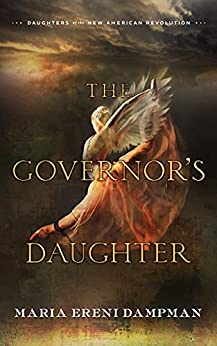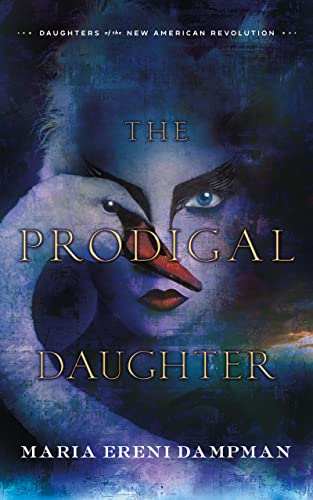Maria Ereni Dampman Author of The Governor's Daughter

Maria Ereni Dampman was born and raised in Wilmington, Delaware. An avid writer since she earned an Honorable Mention with her short story entry in the Scholastic Short Story writing contest when she was in the sixth grade, Maria can’t remember a time since then when she wasn’t writing something ranging from poetry to plays. In college, she joined the Forensic Speech Team, where she competed with speeches she researched, wrote and delivered. In three years she was nationally ranked nine times and had several of her speeches printed in multiple editions of college textbooks. She obtained a B.A. in Communication Studies and Journalism from West Chester University of Pennsylvania, and over the years has written for numerous international newspapers, magazines, forums and blogs.
When Maria isn’t either reading or writing, she can be found on her farm in western Virginia with her husband and a wide variety of rescue animals. She’s known for her work rehabilitating abused horses and rescuing animals ranging from Mammoth American Jackstock to her beloved Plott hounds, Zoey and Furgus.
What inspired you to write your book?
I got the idea for The Governor’s Daughter after watching the Kavanaugh Senate confirmation hearings. Watching Dr. Ford give her heart-wrenching testimony, her truth, to a Senate who had already made up their minds to confirm him positively sickened me. Many years ago, I had been in a similar situation as Dr. Ford. When I came forward to authorities with what happened, I had been strongly discouraged against pressing charges. They told me I would not be believed, that my name would be dragged through the gutter, and I would never be free of the shame and stigma that follows victims of sexual assault. Being young and very frightened, I was coerced into remaining silent.
I have always regretted that decision. I know now they were wrong to talk me out of coming forward, and it’s something that has haunted me my entire life. I want young women to know what I didn’t at the time – that my truth is important and my voice has every right to be heard.
What message do you hope to pass on to readers through your book?
The Daughters of the New American Revolution is a dystopian series based on current events. After the Kavanaugh hearings, I was so sickened by the state of our nation I was having nightmares. I dreamed about losing my voice frequently – I would be somewhere and desperately need to get attention to prevent a tragedy of some sort (it changed frequently) but I couldn’t be heard. I either had lost my voice or couldn’t be heard over a boisterous crowd. What I realized later was that these dreams represented my fear of being silenced again, something I swore I would never allow to happen again. I was afraid of a future where a strong, well-respected woman’s testimony was disregarded, a future I will do everything in my power to prevent.
I talk a lot about voice in my series, especially with my down-trodden characters. The protagonist, Emma, often can’t even physically choke out the words she wants to say because she’s so frightened of the consequences. Declan, a man who was just a boy who went to prison for crimes he didn’t commit, is another character whose truth was ignored and voice was silenced. The long-lasting effects of loss of voice for these two characters will eventually start a revolution. Voice is an extremely powerful tool – and taking that away from someone is something most people find worth fighting for.
What have readers said about your book?
I’ve had numerous critics and readers liken my first novel of the series, The Governor’s Daughter, to The Handmaid’s Tale. Every time someone says that, I get the chills, because Margaret Atwood is one of my all-time favorite authors. I think the comparisons are more based on the material, as we have very different writing styles, but we are both writing lightly-veiled cautionary tales based on current events that could end with catastrophic results.
Tell us about The Governor’s Daughter.
The Governor’s Daughter is about Emma Bellamy, the nineteen year-old daughter of the revered Governor. In 2045 America, Emma lives a life of luxury compared to 98% of Americans who live in extreme poverty and a regular state of semi-starvation. Climate change has made large sections of the nation unusable for farming, and antibiotic-resistant strains of diseases have decimated the pork and cattle industry. Minorities have been driven into ghettos, their assets stolen, their lives miserable as they struggle to live from day to day. Members of the LGBTQIA+ community are forced back into the closet, because if they are found, they will be sent to rehabilitation facilities from which no one has ever returned.
Yet within the high, razor-wire tipped walls of the Premier City in which she lives, Emma knows nothing about how the rest of the nation lives. It’s not until she ends up on a clandestine journey beyond the walls that she realizes everything she has been taught by her father, the white-nationalist based government, the universal church and the state-run propaganda press, are lies. Now, she’s determined to find the truth. She meets the villainized people who live there, she hears their stories, and sees for herself they are no threat to her or her father’s racist government.
Emma also faces other horrors in what the press reports as an enviable life. She’s been sold in marriage to a brute of a man most likely to become the next leader of the nation. With no rights, with no voice, she must do whatever her father or her fiance tell her to do or risk punishment. The Purity Police ensures everyone follows their archaic laws to the letter with death the punishment for anything going against their laws. Emma has made several grave mistakes through the years, and one more giant slip, despite her status, and she could face a firing squad. When she falls for the one man she absolutely cannot have, escape becomes her only hope, but if she is caught, even her powerful father won’t be able to prevent her from being killed.
Yet despite all of this, Emma seeks truth, the right to use her voice and to live and love as she sees fit. When she meets a small group of rebels who think likewise, she has a choice to make – take a chance on the possibility of freedom or live life in a gilded cage chained to a terrifying man that will one day probably kill her?
I am donating ten percent of profits from every book sold to Planned Parenthood. After the new laws passed in Texas that drastically limit a woman’s right to make decisions for her own body, I felt like I needed to do something more to protect our increasingly fragile reproductive rights. Like my character, Emma, I believe our freedoms are worth fighting for, and this is my contribution to our fight. In addition, I’m waiving all speaking fees for political candidates who vow to uphold Roe v. Wade and protect a woman’s right to choose.








Comentarios